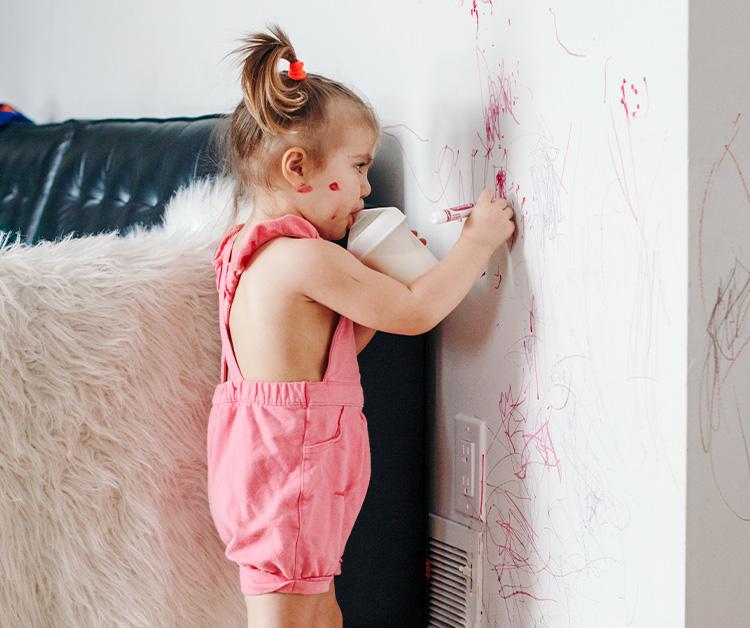Due to maintenance, rewards points for receipt uploads will be delayed. Thank you for your patience!

As a parent, you want your toddler to explore boundaries, but also ensure they behave appropriately. Discover 5 tips on how to help discipline your toddler.
Have you ever been unhappy with your toddler’s behavior, but felt unsure about how best to handle the situation? Or perhaps you’re wondering whether certain rules will encourage your toddler to make good choices as they grow up.
As a parent, you want to encourage your toddler to explore boundaries as a way of developing and growing; but you’ll also want to ensure they know how to behave appropriately. Here are five tips for disciplining your toddler, to help you parent more confidently, and teach your child appropriate ways to interact with the world around them.
Kids enjoy regularity and routine, so any rules you create for your toddler should stay consistent wherever possible. For example, if you use ‘timeouts’ for dealing with unacceptable behavior such as hitting or biting, then try to use these timeouts consistently. That way, your child will develop a clear idea of your consequences for their actions or behaviors.1
Toddlers are busy beings! If something is within reach, chances are they’ll want to explore, play and investigate. With this in mind, if you don’t want your toddler to touch or use certain things in your home (for example, a digital or electronic device such as a phone or speaker) then put them away before toddler playtime. By removing unnecessary temptation from your toddler in the first place, you won’t be setting your child up for the disappointment that could ensue when you ask to take the item back.1
Inevitably, your toddler will sometimes do something you don’t want them to do. For example, they might attempt to go outside without their shoes on, or shout loudly in quiet place, when you’ve asked that they use their inside voice. In these situations, try to tell them what you’d like them to do (using an affirmative where possible, such as “People are reading in here, which is why we need to use our quiet voices). You can then engage your child by encouraging them to focus on something else, redirecting their attention to a favorite book or activity.1
Toddlers are still in the very early stages of learning what’s acceptable and what’s not, but if you need to take a slightly firmer approach with your child, timeouts can be an effective way to discipline. Rather than reacting to your child with anger or frustration, timeout can give your toddler a neutral reaction, and an opportunity to sit out and calm down. If your toddler has been throwing food, or snatching from a friend, you might tell them in a calm voice why their behavior is unacceptable, and give them a minute or two to calm down.1
You can use the basic guide of 1 minute per year of age to assess how long you should make your toddler timeouts. Once over, invite your toddler back to play, and give them your attention to clearly indicate that their timeout has passed.1
Your child will be observing your behavior even when you don’t think they are, so how you deal with things and people can have a big impact on how your toddler behaves.2
If you stay calm when something doesn’t go your way, it’s highly likely your child will learn to do the same in similar situations. It’s crucial that you’re not aggressive towards – or in front of – your child. This can send a strong message that responding to a situation with verbal or physical aggression is a healthy way to express anger.2
If you notice your child being unkind to a friend or a sibling, intervene if it feels that the situation will escalate. However, try not take sides, and listen actively to what each child is saying. This can help your toddler to see that there are calm, effective ways to mediate and manage conflict.2
Even a toddler who barely every plays up can have a tantrum occasionally. In fact, tantrums are an indicator that your child is exploring new skills, but struggling to express their emotions. There can be ways to minimise tantrums, by spotting meltdown triggers such as hunger, or tiredness.
As language and communication skills develop and grow, your child will likely get better at managing their emotions, and tantrums will become less frequent.2
If you find that your toddler’s tantrums are frequently hard to handle, or their behavior is making your anxious, a visit to your doctor can give you the support and guidance you need to create change.2
Toddlers are developing and learning new skills every day. You can support this development by giving your toddler the right nutrition.
Enfagrow has 22 key nutrients that support your toddler's growth and development, such as DHA, iron, and vitamin D. These nutrients help support brain development, which is important for language skills. Learn more.
All information on Enfamil, including but not limited to information about health, medical conditions, and nutrition, is intended for your general knowledge and is not a substitute for a healthcare professional's medical identification, advice, or management for specific medical conditions. You should seek medical care and consult your doctor or pediatrician for any specific health or nutrition issues. Never disregard professional medical advice or delay seeking medical treatment, care, or help because of information you have read on Enfamil.